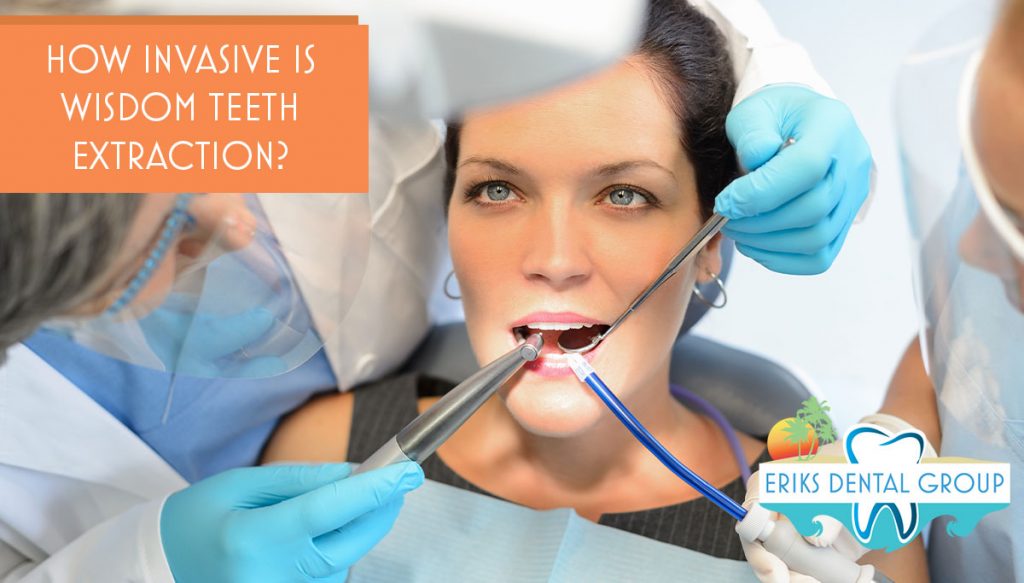Wisdom teeth extraction is one of those procedures that everyone knows about and nearly everyone can feel a bit apprehensive about.
Here at Eriks Dental Group, we are committed to ensuring patients are well informed and set up for life with good dental health. We pride ourselves on providing clear explanations every step of the way. Read our informative guide about what wisdom teeth are, how invasive extraction is, why it can be necessary, what to expect, and what recovery can look like.
What Are Wisdom Teeth?
Wisdom teeth are the last set of molars to arrive. Often developing around age 10, but not surfacing until age 17 (though for some, it can be as late as age 25). The later arrival of these permanent teeth is why they have been dubbed wisdom teeth, as they arrive at a more mature age.
Biologists call these teeth ‘vestigial organs’, which is just a fancy way of saying useless because of evolution. Anthropologists believe that wisdom teeth were once necessary for chewing lean meats, roots, leaves, and nuts. Today, we rely on modern eating utensils instead.
Most people have four–two on the top, two on the bottom but, some people can have more or less than this.
Impacted Wisdom Teeth
Over time, the human jaw is believed to have undergone some shrinkage. As a result, wisdom teeth can become impacted. Impacted wisdom teeth are teeth that do not have enough room to break through the gum surface. Sometimes, impaction can mean that a wisdom tooth is stuck under the gum too.
As a result, impacted wisdom teeth can grow at an angle. The severity of the angle can vary with some angling more towards the right, some towards the left, and others can appear to angle horizontally along the jawbone.
An impacted wisdom tooth can cause:
- Tooth decay
- Damage to other teeth
- Gum disease
- Cysts (Wisdom teeth develop in a sac. When they are impacted, this sac can fill with fluid. Cysts can damage the jawbone and, in severe cases, cause nerve damage.
- Infection
Symptoms can include:
- Swollen, irritated, or bleeding gums
- Swelling of the jaw or jaw pain
- Bad breath
- Difficulty opening mouth
How Invasive is Wisdom Teeth Extraction?
With wisdom teeth extraction, patients are given a local anesthetic beforehand to ensure the mouth and jaw are numb. Some dentists may accompany this with a sedative. For more complicated removal situations, general anesthesia may be necessary.
A small incision is made along the gum for wisdom teeth that have not emerged yet. Then, a small portion of bone is removed from the jawline to access the tooth. Teeth that have crowned may need to be cut into smaller portions for removal. As the tooth is being removed, patients may feel some pressure.
Once the extraction is completed, sutures are placed along the incision of the gum. Some sutures are dissolvable, and some will need to be removed by your dentist.
It is recommended to have wisdom teeth extracted before age 21 since the bones and roots of the tooth are much softer in those years, but the right dental team can navigate removal at any age.
Complications From Extraction
After surgery, some swelling, and bleeding may occur over the next 24 hours. Soreness and some redness or skin discoloration are common.
Rare and uncommon complications can include developing an infection, weakening of the jaw, and sinus or nerve damage.
Recovery and Dental Health Ahead
Most patients recover within 72 hours following wisdom teeth extraction procedures. To aid in recovery, we recommend staying hydrated, eating soft foods only, and using ice to reduce swelling, bleeding, and discomfort.
It’s also important to avoid tobacco products, straws, vigorous exercise, and using straws. Exercise or vigorous activity may dislodge the blood clots that form as the body heals from the incision(s). Tobacco products and straws can increase the risk of developing dry sockets.
In the months and years to come, the lack of wisdom teeth decreases the likelihood of decay and infection.
Make An Appointment with Our Dental Group Today
If you’ve ever experienced wisdom tooth pain, you know there’s nothing wise about it. What is wise is scheduling regular check-ups with x-rays to track and monitor how your wisdom teeth are growing.
Here at Eriks Dental Group, we pride ourselves on providing dental health care for the whole family. Everything you need from cosmetic dentistry, cleanings, teeth whitening, fillings, dental crowns, Invisalign, implants, or root canal therapy can be found right here at our Boynton Beach office. Set up an appointment online, call us at (561)-733-4004.
Not ready for an appointment? Have questions or concerns? Drop us a message here. We look forward to meeting you!

